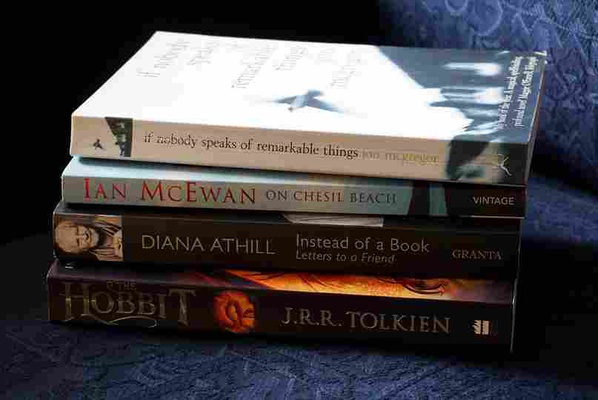Tips for Writing Travel Books and The Benefits of Buying Used Novels

Traveling is a famous experience. You not only get to meet new people and form new relationships, but you also get to try new delicacies and go to new places. Traveling piques your interest, excites you, and gives your life new purpose. It may be your ideal getaway strategy or a mystery adventure.
But you already know that; you've probably traveled so extensively that you could write a book about it. In fact, creating a travel book is a good idea because it can help a lot of people while also providing you with the financial resources to travel even more. To write a travel book, you must be extremely informed about all of the locations featured in the book and be willing to publish it. Here are some suggestions for preparing to write a travel book.
Describe your objective
Whether you realize it or not, every travel is a quest. Consider this: How did it all begin? What are your goals or objectives? Your goal could be as broad as "discover myself" or as particular as "swim in the Atlantic Ocean." It might be as big as "totally transform my life" or as modest as "replace the glass ring my best friend gave me in 1999."
This quest does not have to be your sole motivation for visiting this new location. It could be one of the reasons, or it could become essential once you arrive and spend time here. Consider this: at the heart of all good travel memoirs and articles is a search. George Saunders attempts to build his own perceptions of Dubai independent of the media's depiction of the city in The New Mecca.
David Farley is chasing the secret recipe of a meal found only in the Vietnamese village of Hoi An in Vietnam's Bowl of Secrets. We all know that Elizabeth Gilbert's classic travel narrative Eat, Pray, Love contains a series of deep quests. She wants to move on from her life's painful male relationships and discover a higher significance for herself. When you start writing about your journey, your readers will be curious to discover if she succeeds. Is she able to obtain what she desires? Until the very end, keep the reader guessing.
Avoid using clichés.
Clichés irritate travelers. That was my point. Remove those items. While it's fine to provide in-depth descriptions of your travels, attempt to limit the use of adjectives in your text. Keep things basic and to the point. If something struck you (and you want to describe it), go ahead and do it – but do it from the heart. Other than that, don't do it.
You can! So have faith in yourself.
"There must be so many unpublished travel book authors out there!" you would think. You'd be correct. There are some. That should not deter you; rather, it should encourage you to be unique and true to yourself. As I already stated, do it for the right reasons and be genuine, and you'll sell out in no time.
Make the reader think of a question.
What's the difference between a well-read story and one that hasn't been well-read? The beginning. As early as possible in your opener, ask the reader a question. It isn't necessary for the question to be life-or-death or significant. It might be pretty straightforward.
Such as:
Rand should have been warned, I suppose. (From the Italian town of Pranzo). This is a very brief and straightforward introduction. Do you want to learn more? You certainly do! You're curious as to what Rand should have been warned against. And who exactly is Rand? The question should be intriguing enough to keep the reader intrigued. There's a narrow line between sparking curiosity and befuddling your reader, so tread carefully. At some point in your story, you must also respond to your question.
The reader will be intrigued by what happens next as soon as you ask a question. The desire to know the solution is simply human nature. It's all about how you construct the first sentence.
Tell us what brought you to this location.
What were your initial impressions of this location? Dive deep into your memory to find a specific foundation for these feelings. Was it because of the computer game Carmen Sandiego and the sounds of the names of those exotic cities: Jakarta, Katmandu, and Kuala Lumpur? Was it your freshman year religious studies class, where you watched a movie about monks in Sri Lanka?
It may be anything at all. Even leaving no impression leaves an effect—how did this area completely escape your notice? You may believe that this information is irrelevant. After all, who wouldn't want to visit a paradise like Hawaii? It is, without a doubt, a dream journey for many. But what is your personal dream? Only you have the ability to tell that story. Writing about your first impressions of a place and how it met or didn't match your expectations will give your travel account a lot more depth.
Change things up in the end.
Travel transforms us. Every single time. So, how have you evolved? Have you completed your mission? Whether you succeeded or failed, you learned something in the process of attempting it. Every travel memoir story concludes with a shift. It can be enormous or quite little. A simple adjustment in viewpoint is sufficient to satisfy a reader. Whether the shift is a discovery that you prefer traveling alone or that you have a strong connection to your grandmother's hamlet in Sicily, telling and showing the reader your transition will make your tale interesting and worth sharing.
Take these suggestions with you on your vacation. In the new year, you'll have something exciting to write about. Remember that no one else has been to this location at this time and had the same thoughts and sensations as you.
Buying Used Novels
Buying a book is like shopping for a bibliomaniac; the experience is just as pleasurable as reading the book. As a book lover, nothing surpasses wandering into a bookstore; we may notice a number of books that catch our eye, but we only buy a few due to numerous factors.
We can read a book in a variety of ways, like as an e-book, borrowing a book, or borrowing a book from a library and returning it after reading it, but owning a book brings a whole other level of satisfaction. Few books stay with you throughout your life, and having them in your library is an academic goal. Despite the fact that you have not finished many of the books on your list, you may end yourself spending all of the money set aside for a rainy day on books. It's not just you; we've all been there. That's when I began my search for used novels. You've been wondering if reading old used novels is as enjoyable as reading new novels. This is an important piece to read. Continue reading to discover a few compelling arguments for purchasing a used book rather than a new one.
Benefits of Buying Used Novels
1. The Joy of No Longer Reading Printed Books -
A few remarkable books are no longer in print; having them in your library is a source of tremendous pride. The only way to appreciate reading them is to go to used book stores. Finding a rare print of the book you're seeking for among the dusty piles of a used book store gives you the feeling of coming across a one-of-a-kind antique exotic sculpture. It's fantastic!
2. Used novels that are inexpensive and easily accessible -
Used novels can be found for half the price of new ones. With the money you save from purchasing them, you can buy more used novels. Used book stores, unlike peaceful, shining book stores, allow you to haggle. You can use all of your negotiating talents to get as many second hand novels as you want.
3. The Pleasure of Used Novels Exploration -
Finding the books among the stack of old used novels is just as enjoyable as browsing a second hand books online store. The used novel store is full of surprises; you never know what book you'll come across next. Sometimes you come across a title you had almost given up on, which adds to its originality and enhances the experience. This immense joy of discovery is unlikely to be found in well-organized bookstores. You may leave a used novels store without finding the book you were looking for, but you will never leave without being surprised by the strange prints you come across.
4. The Allure and Warmth of an Old Used Novel-
Like wine, books get better with age. With as many hands as it has passed through, each turn of the page brings you a new story to savor. New books can't compare to the thrill of smelling an old used novel, and e-books can't compare to the feel of a paperback. You'll get a glimpse of the prior owner with each page. This bond you have with this person; you have no idea who is priceless, which you can only acquire with used novels, may have circled or highlighted their favorite passage, which may also be your favorite.
5. Used Novels Environmental Protection -
With the global climate change catastrophe at the forefront, it's vital to help the world in every way we can by repurposing all viable items. Purchasing an old used novel, on the other hand, reduces the number of new printings, reducing paper usage and improving the environment. Our goal is to reduce carbon emissions as much as possible, and each of us should work hard to achieve that goal. You may contribute by purchasing used novels and reducing the amount of new books printed.
6. Books, whether fresh or old, are still books -
Books are books, whether they are new or old. You treat them the same way you treat everyone else. Although the effort required to purchase a used novel differs from that required to purchase a new book, the two are comparable. While you spend money on a new book, you spend all of your time and effort in a second hand bookshop looking for a book that you want. You don't have to handle an old used novel with the same care as a new one, but if you adore both, you'll want to look after it well.



Comments